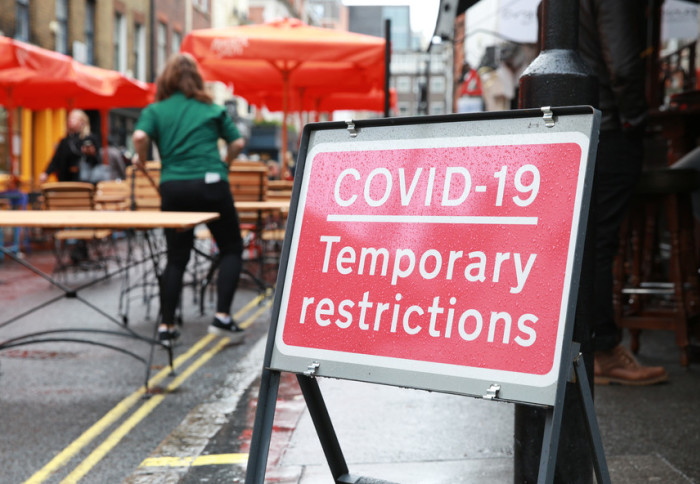
Global S&T Development Trend Analysis Platform of Resources and Environment
| Magnitude of third wave highly uncertain, suggests new analysis | |
| admin | |
| 2021-07-12 | |
| 发布年 | 2021 |
| 语种 | 英语 |
| 国家 | 英国 |
| 领域 | 资源环境 |
| 正文(英文) | 

Increasing social mixing gradually rather than abruptly would delay the peak and reduce the size of the third wave of COVID-19 in England. This is according to a new analysis by the Imperial College COVID-19 Response Team. They say that there is uncertainty around the potential magnitude of the third wave, which will also depend on factors including how effective the vaccine proves against the Delta variant, and levels of vaccine coverage. A large third wave of infections is inevitable if mandatory restrictions are lifted. Professor Neil Ferguson School of Public Health The report, along with work from the University of Warwick and the London School of Hygiene & Tropical Medicine (LSHTM), is informing England’s ‘roadmap’ out of lockdown, has been reviewed by SPI-M and SAGE, but not yet by a peer-reviewed journal. With the Delta variant now dominant across all regions of England, the researchers explored the impact of three different scenarios, including a sudden increase in contact rates on 19th July, a more gradual increase over a six-week period, and step 4 being delayed until 16th August. The analysis also accounted for the uncertainty in key parameters, notably the effectiveness of vaccines against the Delta variant. Across all scenarios explored, the team estimated that lifting restrictions on 19th July in the context of Delta could lead to a significant but highly uncertain third wave of hospitalisations and death with the total number of deaths ranging from 9,400 (estimate range: 4,600 to 19,800) in the most optimistic, to 115,800 (estimate range: 81,700 to 143,600) deaths in the most pessimistic scenario. They found that the scenario where contact rates increase gradually after step 4 on 19th July led to substantially lower numbers of hospitalisations and deaths than the other scenarios examined. Projections not predictionsThe results in the report highlight that it is not possible to make precise predictions of the trajectory of the epidemic in the next 2 months. There is considerable uncertainty regarding the levels of cross protection prior infection gives against infection with Delta, the precise level of vaccine effectiveness against Delta, vaccination coverage and the waning of immunity. The ongoing impact of Track, Trace, Isolate (TTI), mask wearing, and hand hygiene is also difficult to quantify. Professor Neil Ferguson, from the School of Public Health at Imperial College London, said: “The lifting of mandatory restrictions on 19th July is a calculated risk. If individuals remain cautious in the face of rising levels of infection, our analysis suggests that the third wave will be substantially smaller than if contacts immediately revert to pre-pandemic levels. However, a large third wave of infections is inevitable if mandatory restrictions are lifted. It is much harder to predict what this will translate into in terms of hospitalisations and deaths. The link between cases and hospitalisations has been weakened but not severed.” Dr Anne Cori, also from Imperial's School of Public Health, said: “Our results suggest that step 4 of the roadmap will lead to a third wave of infections in England. But its magnitude, and that of the corresponding wave of hospitalisations and deaths, remain highly uncertain. A number of factors are at play: vaccine coverage and effectiveness, persistence of immunity over time, but also voluntary adoption of measures such as working from home or mask wearing which will no longer be mandatory after 19th July. Increases in any of these will help reduce the epidemic burden.” Dr Marc Baguelin, from Imperial's School of Public Health, said: “We explored the impact of lifting current restrictions on July 19th in light of the emergence of Delta variants and following the success of the UK vaccination program. The UK is likely to face a major wave of infections with a surge in hospitalisations and deaths. There remains considerable uncertainty on the final burden of this wave, but our analysis indicates clearly that a gradual change with keeping some cautious behaviours will be critical in mitigating its extent." Dr Pablo Perez-Guzman, from Imperial's School of Public Health, said: “Since the start of the pandemic, we have analysed a large number of national and regional real-time data streams, including numbers of cases in the community, hospital admissions, occupancy and deaths. Our modelling work is based on a deep understanding of how these data, viral transmission dynamics, the effects of the national vaccination programme, the adoption and lifting of non-pharmaceutical interventions and the introduction of new variants like Delta interplay in shaping the national COVID epidemic. Going forward, we aim to further account for new challenges in the national COVID response, like rolling out booster vaccination campaigns and the potential emergence of new variants.” Imperial College’s COVID-19 Response Team are embedded within Imperial’s MRC Centre for Global Infectious Disease Analysis (MRC GIDA) and the Jameel Institute, both based in the School of Public Health. |
| URL | 查看原文 |
| 来源平台 | Imperial College London |
| 文献类型 | 新闻 |
| 条目标识符 | http://119.78.100.173/C666/handle/2XK7JSWQ/333585 |
| 专题 | 资源环境科学 |
| 推荐引用方式 GB/T 7714 | admin. Magnitude of third wave highly uncertain, suggests new analysis. 2021. |
| 条目包含的文件 | 条目无相关文件。 | |||||
| 个性服务 |
| 推荐该条目 |
| 保存到收藏夹 |
| 查看访问统计 |
| 导出为Endnote文件 |
| 谷歌学术 |
| 谷歌学术中相似的文章 |
| [admin]的文章 |
| 百度学术 |
| 百度学术中相似的文章 |
| [admin]的文章 |
| 必应学术 |
| 必应学术中相似的文章 |
| [admin]的文章 |
| 相关权益政策 |
| 暂无数据 |
| 收藏/分享 |
除非特别说明,本系统中所有内容都受版权保护,并保留所有权利。
修改评论